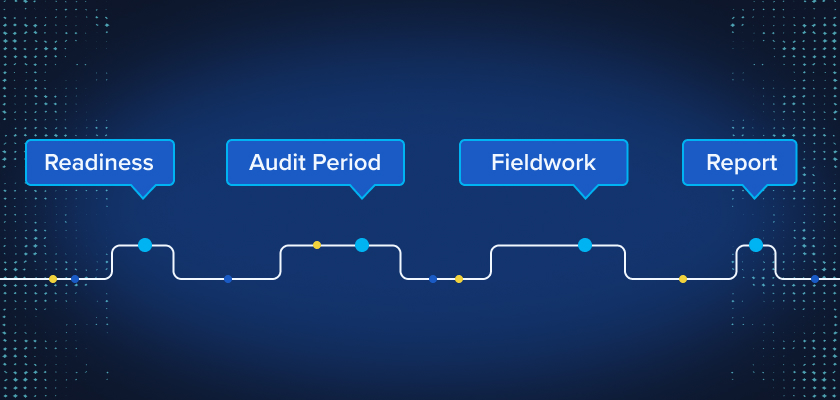
There’s no one-size-fits-all answer to the SOC 2 timeline, it depends on your scope, systems, and whether you’re pursuing a Type I or Type II audit.
But if you’re budgeting time, aligning teams, or building an internal roadmap, it’s critical to understand each phase and what accelerates or delays the process.
This guide walks through the complete SOC 2 timeline, from early prep to final report, so you can plan with confidence.
SOC 2 Type I vs. Type II: Timeline Differences
The biggest factor impacting your SOC 2 timeline is the type of report:
- SOC 2 Type I
Reviews whether controls are properly designed at a specific point in time.
Timeline: Typically 2–4 weeks after you’re ready for audit. - SOC 2 Type II
Reviews whether controls are designed and operating effectively over a defined period (audit window).
Timeline:- Audit window: 3–12 months
- Prep + fieldwork: Add another 4–8 weeks
Summary:
Type I is faster. Type II takes longer but provides stronger client assurance.
SOC 2 Audit Timeline, Step by Step
Here’s what a full SOC 2 journey looks like:
1. Readiness Phase (2–6 weeks)
- Conduct gap analysis (internally or with a platform like Cynomi)
- Draft and implement missing policies
- Assign control ownership
- Begin collecting baseline evidence
2. Audit Window
- Type I: No audit window. Once controls are in place, audit can begin
- Type II: You must operate your controls continuously for 3–12 months
- 3–6 months is common for first-time audits
- 12 months is typical for renewals
- 3–6 months is common for first-time audits
3. Fieldwork & Evidence Review (2–4 weeks)
- Auditor interviews stakeholders
- Collects system logs, screenshots, reports
- Verifies controls are working as described
4. Report Drafting & Finalization (2–4 weeks)
- Auditor compiles findings and issues a draft
- Your team reviews and provides feedback
- Final report is signed, sealed, and ready for customers
What Slows SOC 2 Audits Down?
SOC 2 audits can stall if:
- Documentation is outdated or missing
- No one owns a control, leading to delays in evidence or clarification
- Evidence collection is manual and inconsistent
- Scope expands mid-audit, adding new systems, vendors, or services unexpectedly
- Audit firm access is delayed due to poor coordination or system permissions
How to Keep Your Audit Timeline on Schedule
Avoid costly delays by taking a proactive, structured approach:
- Start with a readiness platform (not spreadsheets)
- Assign owners to each control and clarify responsibilities early
- Automate evidence collection wherever possible
- Choose and engage your auditor early in the process
- Centralize documentation in a version-controlled system
Cut Weeks Off Your SOC 2 Timeline with Cynomi
Cynomi reduces audit time by turning fragmented preparation into an automated, repeatable process.
Here’s how Cynomi accelerates SOC 2:
- Automated Readiness Reviews
Instantly assess your current state and identify control gaps - Audit-Grade Policy Builder
Generate SOC 2-compliant policies in minutes with no manual drafting - Evidence Auto-Collection
Pull system logs, user activity, and control confirmations from platforms like:- AWS
- Okta
- GSuite
- Microsoft 365
- GitHub
Progress Dashboard
Visualize your audit readiness in real-time and track progress across stakeholders
SOC 2 Audit Timeline: Common Questions
Most organizations spend 4–8 weeks on readiness work. Using automation or working with an expert platform can cut that in half.
The audit window, when your controls must operate continuously, is typically 3, 6, or 12 months.
Yes. Starting with a readiness platform, automating evidence, and staying organized can significantly shorten the process.
Your auditor drafts the report, sends it for review, and issues the final version. This usually takes 2–4 weeks.